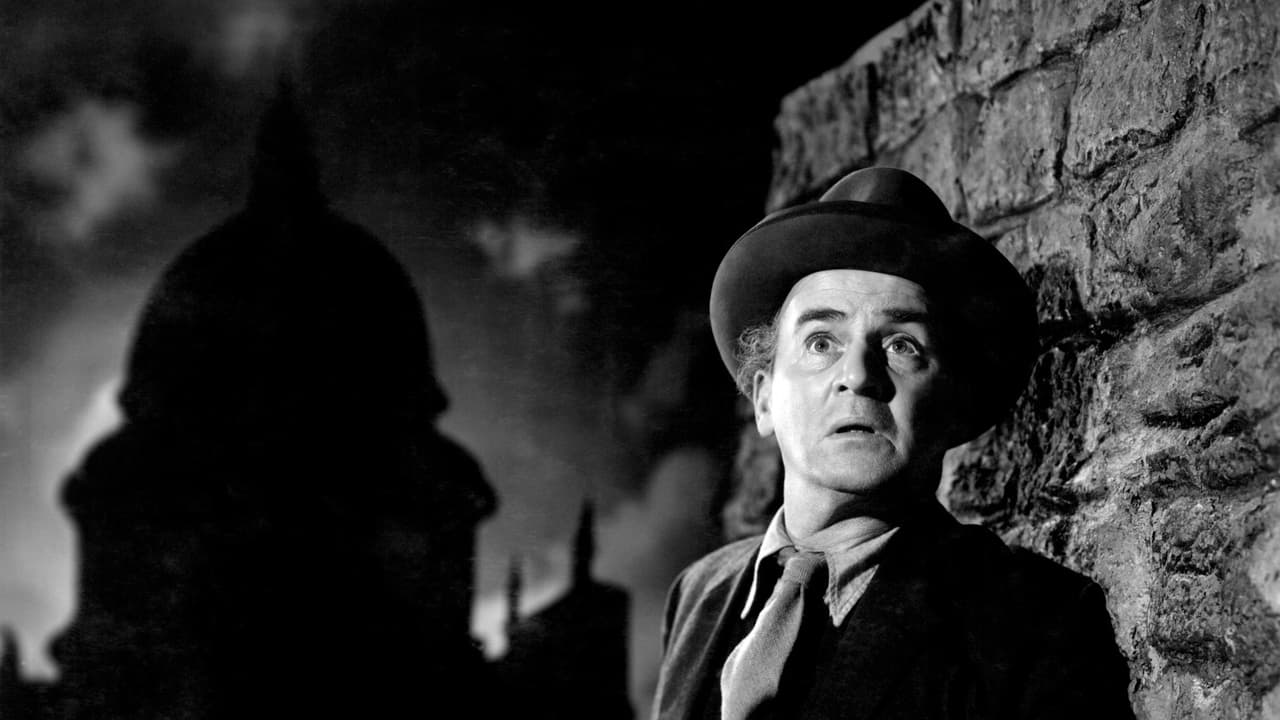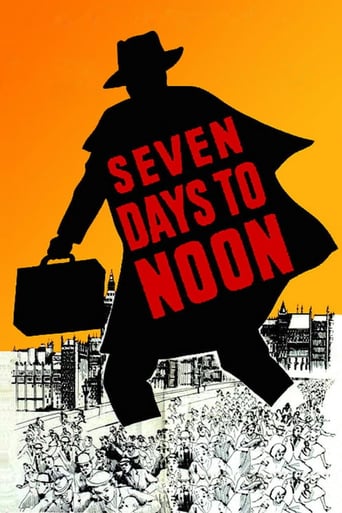



Fantastic!
The storyline feels a little thin and moth-eaten in parts but this sequel is plenty of fun.
View MoreThis is a dark and sometimes deeply uncomfortable drama
View MoreMostly, the movie is committed to the value of a good time.
View MoreStressed out and disillusioned by his work for the UK Government's atomic defence programme, a conflicted scientist, Professor Willingdon, leaves his employment with a unique resignation letter riven with Biblical refrences - they have seven days to dismantle the project or Willington will detonate a miniturised weapon of mass destruction in central London.The Government responds with a manhunt, low key at first, but gradually escalating, spearheaded by Andre Morrell's (of BBC's Quatermass and The Pit fame) quietly determined Special Branch detective. Although the taskforce makes further inroads into Willington's tormented mindset (aided by his daughter and her fiancee), their quarry remains elusive; and as the clock heads towards zero desperate measures are taken...This a first rate British science fiction thriller from British cinema's Golden Era. Tense, well written and acted. The scenes of deserted London are truly haunting. Barry Jones is entirely believable and sympathetic as man pushed to breaking point by demands he considers firstly unnecessary and then immoral. And, like any good science fiction, the issues raised remain as relevant today.Watch this classic and be impressed - it comes recommended.
View MoreMore than one movie was made along the lines of this plot – a scientist decides to turn a deadly weapon against the government or society. I recall at least two others, and each of those lead characters had slightly different reasons. "Seven Days to Noon" may have been the first among the number of films of this nature. But, whether it is or not, this is one tremendous movie. The mystery and intrigue are not something that slowly must be unraveled in this film. They soon become clear. Rather, this movie is made to perfection in the way that it builds suspense and takes the audience along for the ride as Scotland Yard purses the culprit. Will they find Professor Willingdon in time? Will they be able to stop his destruction of a huge area of London radiating (no pun intended) out from the seat of government at Westminster Palace?The plot is superb and one can see why the film won the Oscar for best writing of a motion picture story. But the details of camera work, direction, shooting and other technical aspects are all superb in this film. The acting is top notch as well. The film also shows a well- ordered plan for evacuating London with a few days' notice. In true British stiff upper lip fashion, no one panics. One is tempted to imagine a similar film being made in Los Angeles that likely would show hordes of fleeing, screaming people. This is a very fine movie of suspense, human drama, and detailed police work. The script isn't filled with memorable lines, but I did catch one. Scotland Yard Superintendent Folland (Andre Morell) and the professor's assistant, Stephen Lane (Hugh Cross) are riding in a police car, talking about the professor. Folland says, "Repressing of fear is like trying to hold down the lid of a boiling kettle. Something's got to give eventually."The film also gives a look at some lesser-known but very good performers from early English filmdom. Olive Sloane is very good as Goldie. A younger Joan Hickson is very good as the chain-smoking, nervous landlady, Mrs. Peckett. Audiences everywhere would know her later for her portrayal in many films as Agatha Christie's Miss Marple. And, Ronald Adam plays the prime minister here – a type of role he filled in many of his later films and in TV series. This is a fine first-rate production that most people should enjoy.
View MoreI could be wrong but I think this movie, which I saw when it appeared at local cinemas in 1951, was the very first serious production about the possibility of lone-wolf nuclear terrorism. These days, we probably get a new spin on that concept almost every year at the cinema.So, this film is distinctive for that and many other reasons, not the least of which is the semi-documentary style of the narrative which shows, in exquisite detail, the preparations required to evacuate a modern metropolis in the face of nuclear threat. Obviously, the co-operation of the entire city of London was needed to put it all on film.The title, moreover, is distinctive in that it reverses the biblical myth of the creation of the world in seven days. In this story, the antagonist – an emotionally disturbed nuclear scientist – is dead set upon destroying his world in seven days.It's distinctive also in that it takes us into the mind of the said deranged scientist, Professor Willingdon (Barry Jones), showing how he thinks and how he cleverly evades detection from authorities by his local knowledge, his demeanor with people he meets and by taking advantage of opportunities as they arise. So, it's a lesson in the art of remaining on the run to do your worst.The Boulting brothers use all the best tricks of shadow, low lighting, narrow streets and darkness to great effect. Incidentally, not only are some of the Boulting camera techniques up and down staircases vaguely reminiscent of how Hitchcock used the Bate's staircase in Psycho (1960), but also the introductory, frenetically paced sound track at the start of SDTN certainly caused me an "Ah-ha!" moment when I recalled the opening sound track of Psycho. There is, after all, no greater flattery than copying...Finally, the movie is well-paced over all, with just the appropriate amount of light relief occasionally; most of the time, though, the plot proceeds at a relentless pace as befits an excellent thriller, keeping the viewer glued to the screen. However, it's all done with superb British aplomb and without the need for car chases, crashes, shootings (there is only one shooting) and such like. Along the way, of course, we are given the benefit of the writer's opinions – through the script of course – about nuclear war, nuclear proliferation, the Cold War, national security and so forth; one must expect it, given the times when the film was made.The cast is uniformly good, even excellent, especially Barry Jones. Not to be ignored is Andre Morrell as Special Branch Supt. Folland, a cool, perfect foil to the emotionally troubled Willingdon. Watch for a young – and thin – Geoffrey Keen as a patron in a pub. Special mention goes to Olive Sloane as Goldie who unwittingly becomes Willingdon's companion during his efforts to evade capture. Significantly, and appropriately, Goldie has the last line of the story when – while sitting on her suitcase in the middle of Westminster Bridge and as the All Clear wails across London – she asks her little dog: "What will we do now?"She, of course, decides to walk back home. Today, we, of course, are still wondering what to do about the twin curses of nuclear bombs and nuclear proliferation.Give this ground-breaking, timeless story eight out of ten. Highly recommended.February 18, 2012.
View MoreSorry nearly everything is just so bad in this film. The only highlights for me are seeing 'old' London of the early fifties but even this is cheap, tiresome etc etc - (did I expect though for them to empty London for lengthy stock shots - no but they were just disjointed nothings in the end). The slang cockney voices of posh actresses just grates, and the calmness and wherewithal of the all knowing police authorities defies description. God help us if they had really gone about the task of locating the scientist like this. The scientist character was impossible and just did not hang together. Sorry very poor, unbelievable and I read somewhere about a Hitchcockian suspense atmosphere - well I assure you it's not. The love angle daughter is not up to it, and the male counterpart is a non starter. God, it's a bad bad film- oh I've said that already.
View More